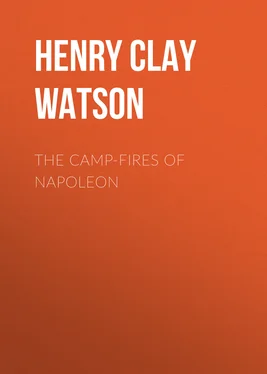Henry Clay Watson - The Camp-fires of Napoleon
Здесь есть возможность читать онлайн «Henry Clay Watson - The Camp-fires of Napoleon» — ознакомительный отрывок электронной книги совершенно бесплатно, а после прочтения отрывка купить полную версию. В некоторых случаях можно слушать аудио, скачать через торрент в формате fb2 и присутствует краткое содержание. Жанр: foreign_prose, foreign_antique, на английском языке. Описание произведения, (предисловие) а так же отзывы посетителей доступны на портале библиотеки ЛибКат.
- Название:The Camp-fires of Napoleon
- Автор:
- Жанр:
- Год:неизвестен
- ISBN:нет данных
- Рейтинг книги:4 / 5. Голосов: 1
-
Избранное:Добавить в избранное
- Отзывы:
-
Ваша оценка:
- 80
- 1
- 2
- 3
- 4
- 5
The Camp-fires of Napoleon: краткое содержание, описание и аннотация
Предлагаем к чтению аннотацию, описание, краткое содержание или предисловие (зависит от того, что написал сам автор книги «The Camp-fires of Napoleon»). Если вы не нашли необходимую информацию о книге — напишите в комментариях, мы постараемся отыскать её.
The Camp-fires of Napoleon — читать онлайн ознакомительный отрывок
Ниже представлен текст книги, разбитый по страницам. Система сохранения места последней прочитанной страницы, позволяет с удобством читать онлайн бесплатно книгу «The Camp-fires of Napoleon», без необходимости каждый раз заново искать на чём Вы остановились. Поставьте закладку, и сможете в любой момент перейти на страницу, на которой закончили чтение.
Интервал:
Закладка:
Henry C. Watson
The Camp-fires of Napoleon / Comprising The Most Brilliant Achievemnents of the Emperor / and His Marshals
PREFACE
The vivid pictures of war, however ensanguined, have a wonderful attraction for the mass of men. They stir the heart like a trumpet. No narratives are so generally perused with avidity as those of “feats of broils and battles;” for in them, in spite of many disgusting features, there is always something to excite a pleasing thrill. We love excitement, and it seems that it is to war, and the descriptions of its varied scenes of danger, during which the faculties of the combatants are roused to extraordinary strength, that most look for the gratification of their natural desires. We have heard of many persons who, in the abstract, condemn all wars as brutal and degrading to humanity, peruse, with unwearied attention, narratives of the campaigns of great generals, and dwell upon their details with evident manifestations of delight. The passion is irresistible.
In this work, the author has endeavored to present to the mental eye, more vividly than the so-termed dignity of ordinary history permits, the most striking scenes and remarkable personages of Napoleon’s astonishing career of glory—to show the greatest warrior of any age in the field, and at the nightly bivouacs—upon the fertile plains of Piedmont—in the shadow of the Egyptian pyramids—amid the forests of Germany, and on the frozen plains of Russia—surrounded by his galaxy of splendid generals, his military family—to illustrate a passage in the history of Europe, which, for stirring scenes and powerful characters, has, perhaps, no parallel. From the camp-fire at Toulon, where the young lieutenant of artillery gave the first impression of his wonderful genius, till the terrible night of darkness and death following the battle of Waterloo, the career of Napoleon is traced by his bivouacs; and around each watch-fire is grouped the incidents of the conflicts which there occurred. The salient points in the life of the great warrior are, therefore, illumined, so as to fix them in the memory.
Who can know the incidents of that career of glory without astonishment? We find a genius, under the smile of fortune, rising from the ranks of the people to the summit of despotic power—surpassing the generalship of Hannibal—the statesmanship of Cæsar, and performing exploits, which, before his time, were placed among the impossible. There is imperishable interest attached to every event in the life of such a character; and, therefore, no work which honestly aims to illustrate them can be considered superfluous.
It is hoped that the numerous engravings will add to the attractions of the book, and render its word-pictures clearer and more perfect to the mind. Their value is so well established, that the time is approaching when few historical works will be published without such illustrations.
THE CAMP-FIRE AT TOULON
It was the night of the 19th of December, 1793. A sky of darkness, unbroken by the twinkling of a single star, arched over the town and harbor of Toulon. But on the rugged heights of Balagrier and L’Equillette, where the English had vainly constructed their “Little Gibraltar,” the watch-fires of the French beseigers were redly burning; sending up showers of sparks, which looked like rising stars against the intense blackness of the heavens. It was the 19th of December, and the fate of Toulon, which for four months had lingered in the balance, was decided. Britons, Spaniards, Neapolitans and French—a garrison of the enemies of the republic—had fought in vain. The “Little Gibraltar,” which commanded the town and harbor was in the hands of the French; their troops were even forcing their way into the town, and consternation had seized those who dared to oppose the decrees of the Committee of Safety, as well as those who had so promptly tendered them aid. The evacuation of Toulon had been hurriedly resolved; and now, as the red gleam of the watch-fires and the blaze of the thundering artillery shone upon the dark waters of the bay, crowds of trembling people could be seen embarking in vessels of all kinds, glad to avail themselves of the protection of the English fleet, to escape the bloody revenge of the triumphant republicans.
The batteries of the “Little Gibraltar,” were already sending a shower of death upon the hostile fleet in the roadstead. On a rock, by a small blazing fire, and just above a battery, a form could be dimly seen through the smoke of the guns, which was destined to rise as a terrible image before the eyes of Europe, as it stood now, the conqueror of the foes of France, at Toulon. It was a slender form, on which the costume of a commandant of artillery hung loosely. But the inexorable resolution of the pale face, and the keen, quick flashes of the eagle eyes, caused those who gazed to forget all but awe and wonder before this genius of war. Occasionally, between the reports of the heavy guns, could be heard the shrill voice of command, which none refused to obey—it would be obeyed. Those eyes had seen where to strike, and that voice had commanded, the blow which brought Toulon to the feet of the republic. The commander was Napoleon Bonaparte, the young Corsican—the pet of Paoli—the child cradled amid the civil wars of his native island—who had made the cannon his toy—and who had been educated to war at the military school of Brienne. A subordinate, he had compelled his superior officers to bow before the oracles of his genius. One after another they had yielded, till the last, General Dugommier, a brave old warrior, acknowledged his artillery officer as the conqueror of Toulon.
That was a proud moment for the young Napoleon. He knew that the triumph was secured, and that to him, alone, it was due; for his plan had prevailed against the ignorant and imbecile schemes of the republic’s generals, and his devices for rousing an irresistible enthusiasm in the troops,—such as naming a battery in a desperate position, the battery “ des hommes sans peur ” had rendered the execution of that plan complete. And now the enemy were preparing for flight—precipitate flight.
“A cooler aim—cut down a flag, brave Junot!” commands the shrill voice, amid the thunder of the guns, and the dusky, slovenly looking artillery man on the right of the battery, fronting Napoleon, steadily watches for a moment when the red glare shall show him a portion of the fleet in the roadstead. A glimpse of the cross of St. George! Loud thunders the gun, and at the next vivid glare, the flag falls; and amid the roar of the storm of death rises the cheer of the artillery men.
“Well done, Junot!” exclaimed the shrill voice. The slovenly man who brought down the cross of St. George was Andoche Junot, afterwards Marshal of France and Duke d’Abrantes, whose cool courage had more than once won the commendation of the commandant during this memorable siege.
But now occurred a scene which caused the fire of the “Little Gibraltar,” to slacken. Even as Napoleon spoke to Junot, he discovered a spreading flame in the harbor, and in a few moments, great tongues of fire licked the air in front of the town, and fit up the scene for miles around with a terrible brilliancy. The English and Spaniards, under the direction of Sir Sydney Smith, had set fire to the arsenal, the stores, and the French ships which they could not remove. The rising flames, growing redder and redder, seemed at length like the glowing crater of a volcano, amid which could be seen the masts and yards of the burning vessels, and the advance of the republican troops who were attempting to force their way into the town. The waters of the bay resembled streams of lava flowing from the mountains and hills around the town, which, themselves glowed like living coals.
Читать дальшеИнтервал:
Закладка:
Похожие книги на «The Camp-fires of Napoleon»
Представляем Вашему вниманию похожие книги на «The Camp-fires of Napoleon» списком для выбора. Мы отобрали схожую по названию и смыслу литературу в надежде предоставить читателям больше вариантов отыскать новые, интересные, ещё непрочитанные произведения.
Обсуждение, отзывы о книге «The Camp-fires of Napoleon» и просто собственные мнения читателей. Оставьте ваши комментарии, напишите, что Вы думаете о произведении, его смысле или главных героях. Укажите что конкретно понравилось, а что нет, и почему Вы так считаете.












